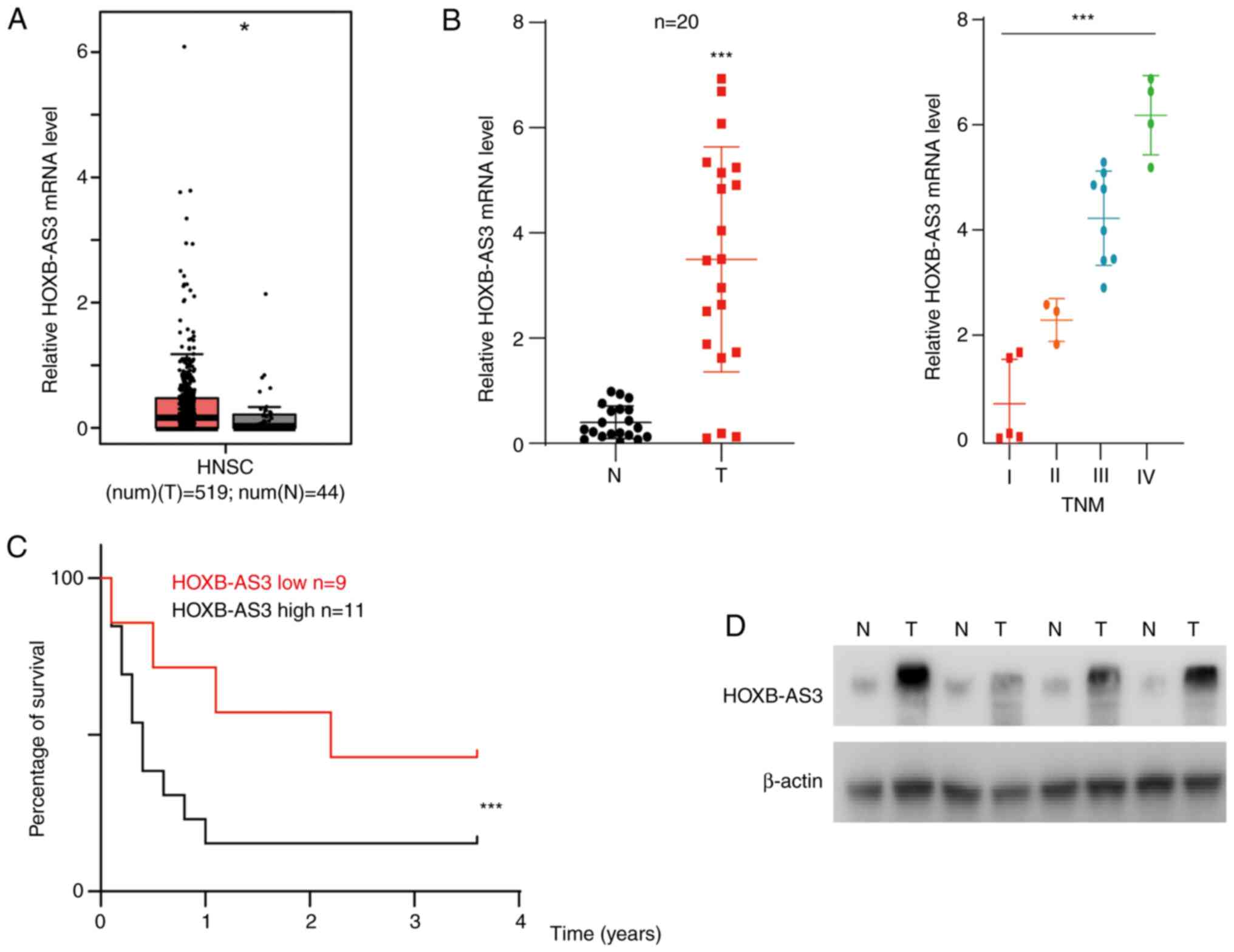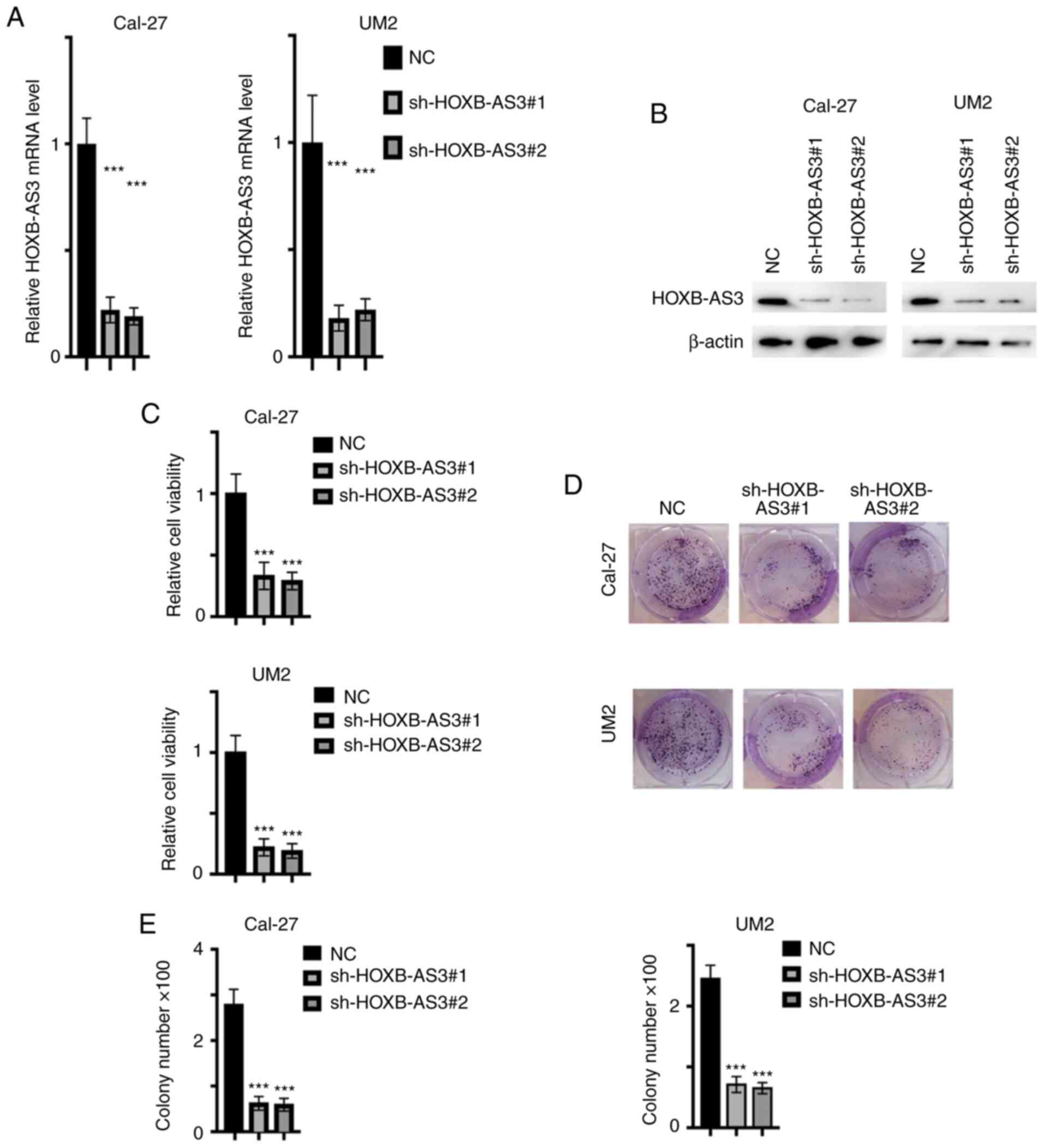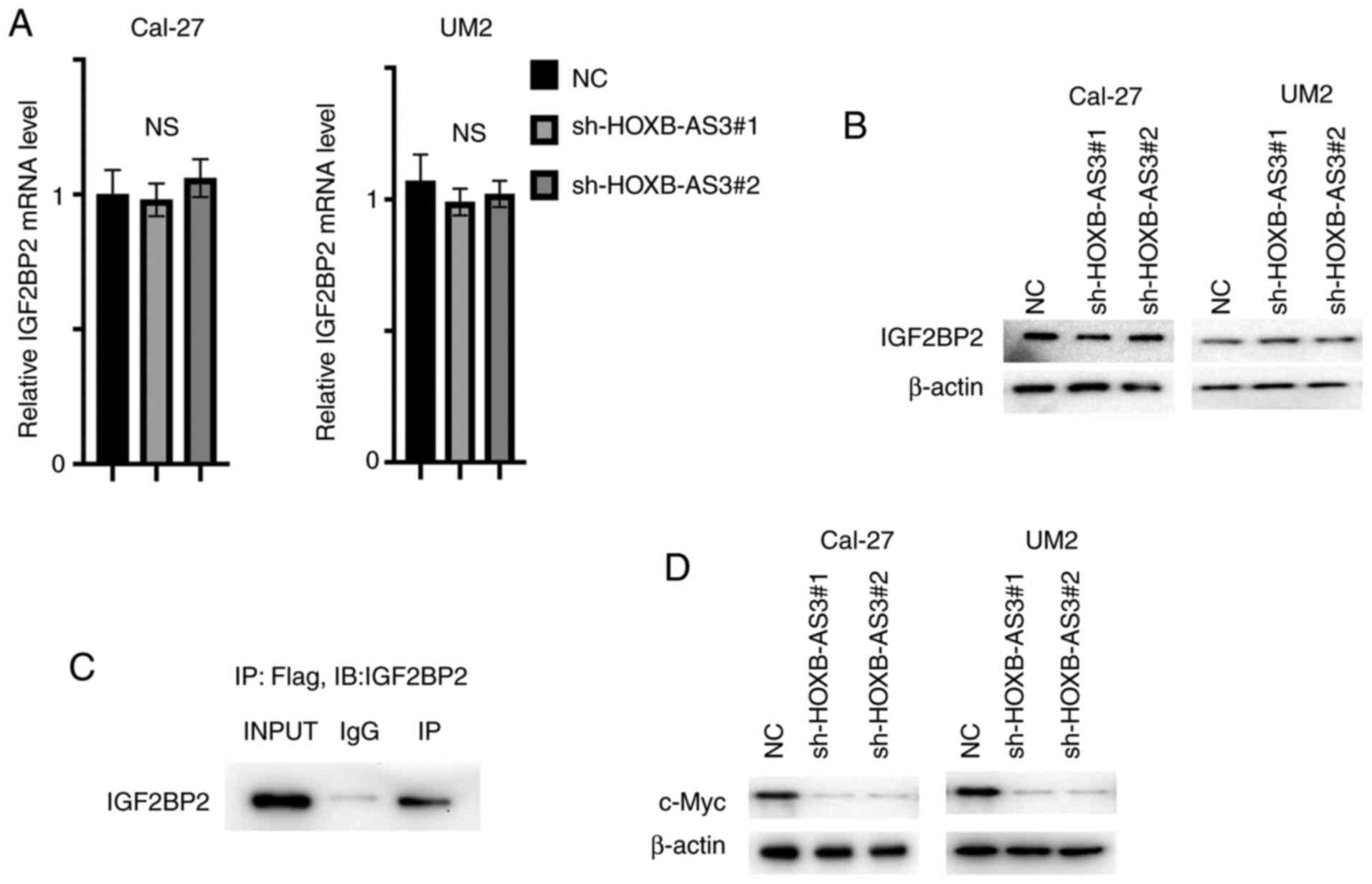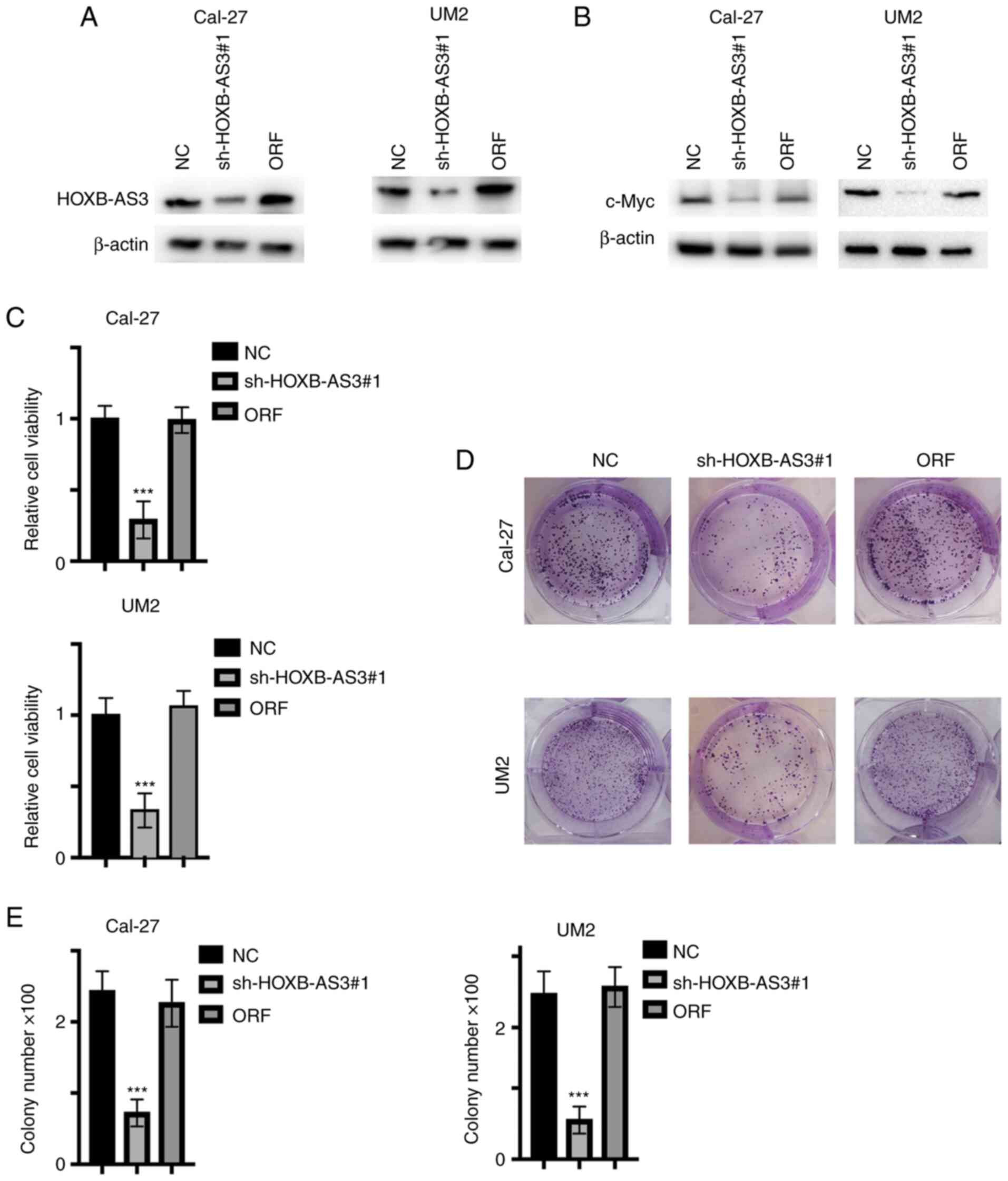|
1
|
Bray F, Ferlay J, Soerjomataram I, Siegel
RL, Torre LA and Jemal A: Global cancer statistics 2018: GLOBOCAN
estimates of incidence and mortality worldwide for 36 cancers in
185 countries. CA Cancer J Clin. 68:394–424. 2018. View Article : Google Scholar : PubMed/NCBI
|
|
2
|
Li P, Fang Q, Yang Y, Chen D, Du W, Liu F
and Luo R: Survival significance of number of positive lymph nodes
in oral squamous cell carcinoma stratified by p16. Front Oncol.
11:5454332021. View Article : Google Scholar : PubMed/NCBI
|
|
3
|
Antonsson A, de Souza M, Wood ZC, Carroll
A, Van K, Paterson L, Pandeya N and Whiteman DC: Natural history of
oral HPV infection: Longitudinal analyses in prospective cohorts
from Australia. Int J Cancer. 148:1964–1972. 2021. View Article : Google Scholar : PubMed/NCBI
|
|
4
|
Panarese I, Aquino G, Ronchi A, Longo F,
Montella M, Cozzolino I, Roccuzzo G, Colella G, Caraglia M and
Franco R: Oral and Oropharyngeal squamous cell carcinoma:
Prognostic and predictive parameters in the etiopathogenetic route.
Expert Rev Anticancer Ther. 19:105–119. 2019. View Article : Google Scholar : PubMed/NCBI
|
|
5
|
Yang H, Zhang Z, Peng R, Zhang L, Liu H,
Wang X, Tian Y and Sun Y: RNA-Seq analysis reveals critical
transcriptome changes caused by sodium butyrate in DN mouse models.
Biosci Rep. 30:BSR202030052021. View Article : Google Scholar
|
|
6
|
Yan T, Shen C, Jiang P, Yu C, Guo F, Tian
X, Zhu X, Lu S, Han B, Zhong M, et al: Risk SNP-induced
lncRNA-SLCC1 drives colorectal cancer through activating glycolysis
signaling. Signal Transduct Target Ther. 6:702021. View Article : Google Scholar : PubMed/NCBI
|
|
7
|
Qin Y, Hou Y, Liu S, Zhu P, Wan X, Zhao M,
Peng M, Zeng H, Li Q, Jin T, et al: A novel long non-coding RNA
lnc030 maintains breast cancer stem cell stemness by stabilizing
SQLE mRNA and increasing cholesterol synthesis. Adv Sci (Weinh).
8:20022322020. View Article : Google Scholar : PubMed/NCBI
|
|
8
|
Zhang F, Wang H, Yu J, Yao X, Yang S, Li
W, Xu L and Zhao L: LncRNA CRNDE attenuates chemoresistance in
gastric cancer via SRSF6-regulated alternative splicing of PICALM.
Mol Cancer. 20:62021. View Article : Google Scholar : PubMed/NCBI
|
|
9
|
Huang JZ, Chen M, Chen D, Gao XC, Zhu S,
Huang H, Hu M, Zhu H and Yan GR: A peptide encoded by a putative
lncRNA HOXB-AS3 suppresses colon cancer growth. Mol Cell.
68:171–184, e6. 2017. View Article : Google Scholar : PubMed/NCBI
|
|
10
|
Xu S, Jia G, Zhang H, Wang L, Cong Y, Lv
M, Xu J, Ruan H, Jia X, Xu P and Wang Y: LncRNA HOXB-AS3 promotes
growth, invasion and migration of epithelial ovarian cancer by
altering glycolysis. Life Sci. 264:1186362021. View Article : Google Scholar : PubMed/NCBI
|
|
11
|
Papaioannou D, Petri A, Dovey OM, Terreri
S, Wang E, Collins FA, Woodward LA, Walker AE, Nicolet D, Pepe F,
et al: The long non-coding RNA HOXB-AS3 regulates ribosomal RNA
transcription in NPM1-mutated acute myeloid leukemia. Nat Commun.
10:53512019. View Article : Google Scholar : PubMed/NCBI
|
|
12
|
Beltramini GA, Belloni LM, Fusco N,
Sacconi A, Muti P, Baj A, Bolzoni AR and Giannì AB: Comparing
prognostic utility between the 8th edition of TNM staging system
and the lymph node ratio for oral squamous cell carcinoma. Head
Neck. Jun 11–2021.(Epub ahead of Print). View Article : Google Scholar : PubMed/NCBI
|
|
13
|
Livak KJ and Schmittgen TD: Analysis of
relative gene expression data using real-time quantitative PCR and
the 2(-Delta Delta C(T)) method. Methods. 25:402–408. 2001.
View Article : Google Scholar : PubMed/NCBI
|
|
14
|
Huang H, Weng H, Sun W, Qin X, Shi H, Wu
H, Zhao BS, Mesquita A, Liu C, Yuan CL, et al: Recognition of RNA
N6-methyladenosine by IGF2BP proteins enhances mRNA
stability and translation. Nat Cell Biol. 20:285–295. 2018.
View Article : Google Scholar : PubMed/NCBI
|
|
15
|
Cheng J, Zhou X, Feng W, Jia M, Zhang X,
An T, Luan M, Pan Y, Zhang S, Zhou Z, et al: Risk stratification by
long non-coding RNAs profiling in COVID-19 patients. J Cell Mol
Med. 25:4753–4764. 2021. View Article : Google Scholar : PubMed/NCBI
|
|
16
|
Starzynska A, Adamska P, Sejda A,
Sakowicz-Burkiewicz M, Adamski ŁJ, Marvaso G, Wychowański P and
Jereczek-Fossa BA: Any role of PIK3CA and PTEN biomarkers in the
prognosis in oral squamous cell carcinoma? Life (Basel).
10:3252020.PubMed/NCBI
|
|
17
|
Manikandan M, Deva Magendhra Rao AK,
Arunkumar G, Manickavasagam M, Rajkumar KS, Rajaraman R and
Munirajan AK: Oral squamous cell carcinoma: MicroRNA expression
profiling and integrative analyses for elucidation of
tumourigenesis mechanism. Mol Cancer. 15:282016. View Article : Google Scholar : PubMed/NCBI
|
|
18
|
Saravani S, Parsamanesh N and
Miri-Moghaddam E: Role of EGFR gene polymorphisms in oral squamous
cell carcinoma patients of Southeast Iran: A case-control study.
Caspian J Intern Med. 11:391–397. 2020.PubMed/NCBI
|
|
19
|
Ren X, Li L, Wu J, Lin K, He Y and Bian L:
PDGF-BB regulates the transformation of fibroblasts into
cancer-associated fibroblasts via the lncRNA
LURAP1L-AS1/LURAP1L/IKK/IκB/NF-κB signaling pathway. Oncol Lett.
22:5372021. View Article : Google Scholar : PubMed/NCBI
|
|
20
|
Che H, Che Y, Zhang Z and Lu Q: Long
non-coding RNA LINC01929 accelerates progression of oral squamous
cell carcinoma by targeting the miR-137-3p/FOXC1 axis. Front Oncol.
11:6578762021. View Article : Google Scholar : PubMed/NCBI
|
|
21
|
Ai Y, Wei H, Wu S, Tang Z, Li X and Zou C:
Exosomal lncRNA LBX1-AS1 derived from RBPJ
overexpressed-macrophages inhibits oral squamous cell carcinoma
progress via miR-182-5p/FOXO3. Front Oncol. 11:6058842021.
View Article : Google Scholar : PubMed/NCBI
|
|
22
|
Yu Q, Du Y, Wang S and Zheng X: LncRNA
PART1 promotes cell proliferation and inhibits apoptosis of oral
squamous cell carcinoma by blocking EZH2 degradation. J Biochem.
Mar 16–2021.(Epub ahead of Print). View Article : Google Scholar
|
|
23
|
Lu S, Zhang J, Lian X, Sun L, Meng K, Chen
Y, Sun Z, Yin X, Li Y, Zhao J, et al: A hidden human proteome
encoded by ‘non-coding’ genes. Nucleic Acids Res. 47:8111–8125.
2019. View Article : Google Scholar : PubMed/NCBI
|
|
24
|
Jiang W, Kai J, Li D, Wei Z, Wang Y and
Wang W: lncRNA HOXB-AS3 exacerbates proliferation, migration, and
invasion of lung cancer via activating the PI3K-AKT pathway. J Cell
Physiol. 235:7194–7203. 2020. View Article : Google Scholar : PubMed/NCBI
|


















